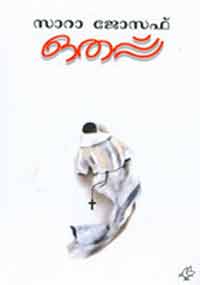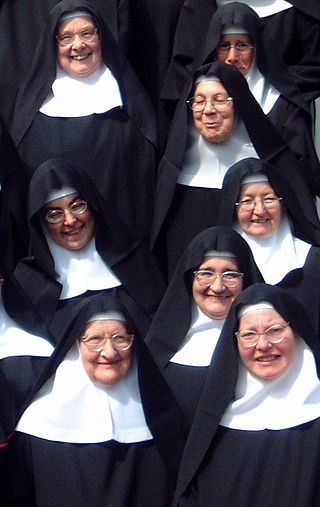
A nun is a woman who vows to dedicate her life to religious service and contemplation, typically living under vows of poverty, chastity, and obedience in the enclosure of a monastery or convent. The term is often used interchangeably with religious sisters who do take simple vows but live an active vocation of prayer and charitable work.
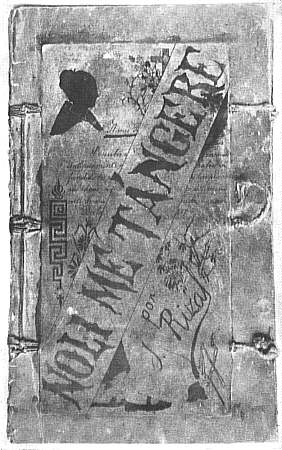
Noli Me Tángere is a novel by Filipino writer and activist José Rizal and was published during the Spanish colonial period of the Philippines. It explores inequities in law and practice in terms of the treatment by the ruling government and the Spanish Catholic friars of the resident peoples in the late 19th century.
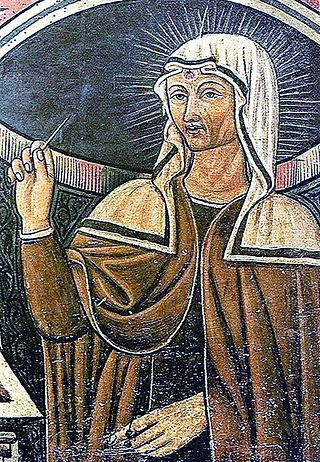
Rita of Cascia, OSA, was an Italian widow and Augustinian nun. After Rita's husband died, she joined a small community of nuns, who later became Augustinians, where she was known both for practicing mortification of the flesh and for the efficacy of her prayers. Various miracles are attributed to her intercession, and she is often portrayed with a bleeding wound on her forehead, which is understood to indicate a partial stigmata.

The Monk: A Romance is a Gothic novel by Matthew Gregory Lewis, published in 1796 across three volumes. Written early in Lewis's career, it was published before he turned twenty, and he withheld his name from the first edition. It tells the story of a virtuous monk who gives into his lustful urges, setting off a chain of events that leave him damned. It is a prime example of the type of Gothic that specializes in horror.

Monica was an early North African Christian saint and the mother of Augustine of Hippo. She is remembered and honored in the Catholic and Orthodox Churches, albeit on different feast days, for her outstanding Christian virtues, particularly the suffering caused by her husband's adultery, and her prayerful life dedicated to the reformation of her son, who wrote extensively of her pious acts and life with her in his Confessions. Popular Christian legends recall Monica weeping every night for her son Augustine.

The Sands of Time is a 1988 action novel by author Sidney Sheldon. The novel follows the adventures of four women who are forced to leave their Spanish convent for the outside world of threat, violence and passions; and two men who are pitted against each other in a fight to the death.

Cosette is a fictional character in the 1862 novel Les Misérables by Victor Hugo and in the many adaptations of the story for stage, film, and television. Her birth name, Euphrasie, is only mentioned briefly. As the orphaned child of an unmarried mother deserted by her father, Hugo never gives her a surname. In the course of the novel, she is mistakenly identified as Ursule, Lark, or Mademoiselle Lanoire.

Father Dowling Mysteries, known as Father Dowling Investigates in the United Kingdom, is an American mystery television series first aired from January 20, 1989, to May 2, 1991. The series was preceded by the 1987 television movie Fatal Confession. NBC aired the first season, while ABC broadcast two additional seasons.
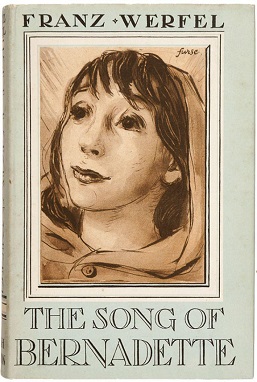
The Song of Bernadette is a 1941 novel that tells the story of Saint Bernadette Soubirous, who, from February to July 1858 reported eighteen visions of the Blessed Virgin Mary in Lourdes, France. The novel was written by Franz Werfel and translated into English by Lewis Lewisohn in 1942. It was extremely popular, spending more than a year on the New York Times Best Seller list and 13 weeks in first place.

Carmella Cammeniti is a fictional character from the Australian Network Ten soap opera Neighbours, played by Natalie Blair. She appeared on a recurring basis from 2003 to 2005, then became a main character from 2006 to 2008, before making a final guest appearance in 2011. Carmella was created as a replacement for Nina Tucker, portrayed by Delta Goodrem, who was written out of the series when Goodrem became ill. Her early storylines, including a romance with Connor O'Neill, were originally intended for Nina. The daughter of a protective gangster father, Carmella was initially a "fun, feisty" character. She gradually became "tortured [and] depressive", with storylines which saw her attract the attention of a stalker, become a nun, suffer facial scarring, develop an addiction to prescription medication and lose her husband after a bushfire.
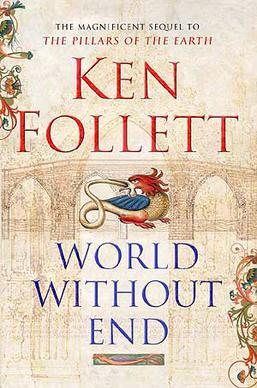
World Without End is a best-selling 2007 historical fiction novel by Welsh author Ken Follett. It is the second book in the Kingsbridge Series, and is the sequel to 1989's The Pillars of the Earth.

Marie Horton is a fictional character on the NBC soap opera, Days of Our Lives. Created by DOOL creator Ted Corday, actress Maree Cheatham is most recognized in the role, originating it on the debut episode of the serial airing November 8, 1965, and last appearing on June 28, 2010. The youngest child of Tom and Alice Horton, she is the mother of Jessica Blake Fallon and grandmother of Nick Fallon.

Camila is a 1984 Argentine drama film directed by María Luisa Bemberg, based on the story of the 19th-century Argentine socialite Camila O'Gorman. The story had previously been adapted in 1910 by Mario Gallo, in the now considered lost film Camila O'Gorman. It was nominated for the Academy Award for Best Foreign Language Film, marking the second time an Argentine film was nominated for this award.
The Catholic Church has been criticised in fiction, such as literature, film and television. Polemics have also been written on the Church and its practices. Some examples are the anti-Catholic stereotypes that filled Gothic fiction of Anglican England, the films of Luis Buñuel who took issue with the Church in Spain, the humor of some US television pundits like Rosie O'Donnell, and the rhetoric of some fundamentalist preachers.
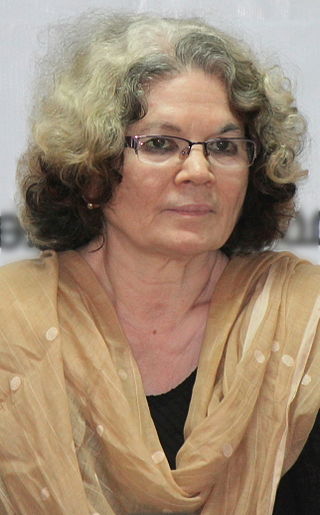
Sarah Joseph is an Indian novelist and short story writer in Malayalam. She won the Kendra Sahitya Akademi Award and the Vayalar Award for her novel Aalahayude Penmakkal. She is a leader of the feminist movement in Kerala and is the founder of the activist organization Manushi. She joined the Aam Aadmi Party in 2014 and contested the 2014 parliament elections from Thrissur Lok Sabha constituency.
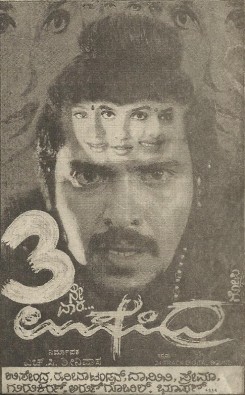
Upendra is a 1999 Indian Kannada-language psychological drama thriller film written and directed by Upendra. It stars Upendra, Raveena Tandon, Prema and Damini. It is an allegorical film, which explores three human emotions through the relationship between the main character and the three heroines and touches upon Maslow's hierarchy of needs. The lyrics were written by Upendra and the music was composed by Gurukiran. The film developed a cult fanbase and is said that the director named it Upendra with the thought that the name includes the names of the main characters of the film.

Aalahayude Penmakkal is a Malayalam novel written by Sarah Joseph and published in 1999. The novel is the first in the trilogy which includes 'Mattathi' and 'Othappu'. This novel gave widespread recognition to Sarah Joseph and her craft. 'Aalahayude Penmakkal' won the Kerala Sahitya Academy award of 2001, Kendra Sahitya Academy award of 2003, Vayalar Ramavarma award of 2004, and Cherukad Award of 2000. The novel deals with the condition of marginalized groups in society pointed out as subalterns by Marxist Antonio Gramsci. The living and existential conditions of these groups are seldom acknowledged by the society at large and generally they are displaced from their places of stay and livelihoods, usually in the name of development and change. This transformation in their existential struggle is narrated by Annie, the central character, who gives voice to three generations of her subaltern group albeit with a feminine perspective.

Santa Monica Parish Church, commonly known as Minalin Church, is a Baroque Roman Catholic church, located in poblacion area of San Nicolas in Minalin, Pampanga, Philippines. The church, built during the Spanish era, was declared a National Cultural Treasure by the National Commission for Culture and the Arts and the National Museum of the Philippines on August 27, 2011, one of 37 churches in the country bestowed that honor.

St. Agatha is a 2018 American horror film directed by Darren Lynn Bousman and starring Sabrina Kern and Carolyn Hennesy. It premiered at the Overlook Film Festival on April 20, 2018.
